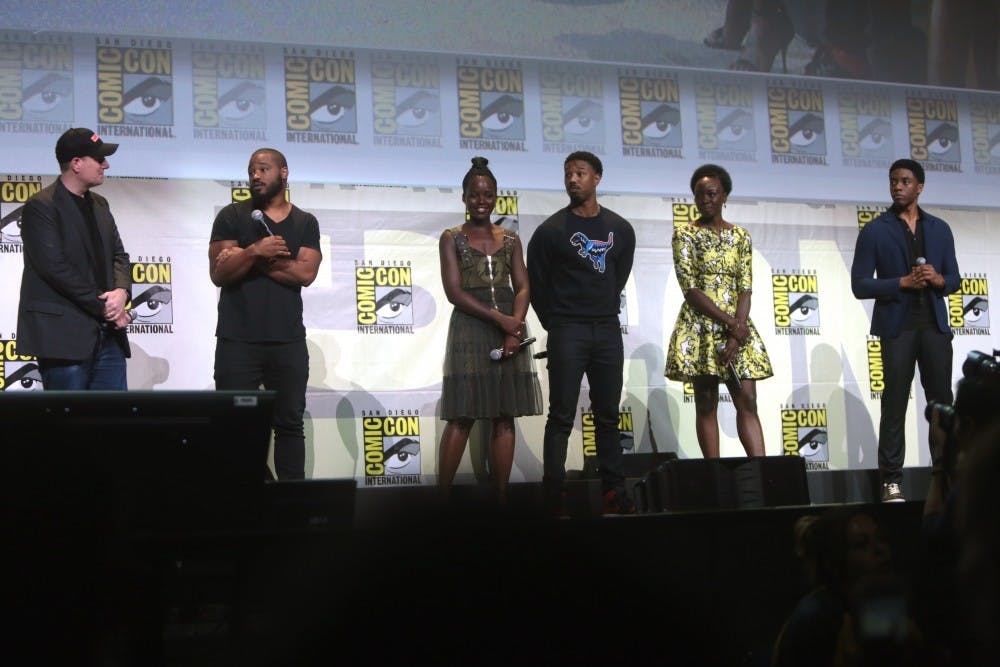I’m just going to get this out of the way right now: Black Panther is a really good movie — incredibly good. You should definitely go see it. It is a thought-provoking essay on racial issues with a wonderful cast. It is a philosophical tale about the ways that we interact with our culture and our past and whether or not those traditions should be preserved moving into the future.
Oh and it’s also an amazingly funny and entertaining superhero movie, arguably one of the best Marvel movies to date.
Black Panther picks up shortly after the events of 2016’s Captain America: Civil War. T’Challa (Chadwick Boseman), the titular hero, returns to his home nation of Wakanda — an African country that is secretly the most technologically advanced nation in the world, thanks to a natural deposit of an incredibly valuable metal — in order to replace his late father as king.
However, he soon discovers that a mysterious new villain, Killmonger, played by Michael B. Jordan, seeks to use Wakandan technology to conquer the rest of the world.
However, despite the pressing threat from the outside world, Wakanda is more threatened by the possibility of change. The nation has long protected itself from harm by hiding all of its magnificent technology from the eyes of the world, technology that could easily be used to save millions of lives.
In his attempts to save his home, T’Challa must also decide its future: whether to expose their true society and risk retaliation or hoard their natural wealth and remain in the shadows.
Right from the start, it is clear that Black Panther is a film with a lot to say. It touches on so many issues, like the struggle to reconcile one’s cultural history with the modern world or the realization that the people we admire usually do not live up to the pedestal that we set them on.
Unsurprisingly, many of those discussions are interwoven with issues of race. The film comments a lot on diaspora and the feeling of being isolated from one’s heritage and homeland, while references to slavery, oppression and prejudice pepper the dialogue.
All of these issues are deftly handled, and Black Panther’s examination is simple, yet incredibly nuanced for a two-hour film.
The film is able to balance all of these plot threads in large part thanks to its incredibly talented cast. Most of the characters are T’Challa’s friends and family, and although Boseman does well in the serious scenes, he excels when T’Challa is able to relax and talk with the people that he knows and loves.
On the opposite end of the spectrum, Jordan’s Killmonger is aggressive and dramatic, although never to the point of excess. There’s a lot of pain present in the character, and Jordan never allows his portrayal to become unsympathetic.
The supporting cast are no less talented and compelling than the leads. Danai Gurira plays Okoye, the leader of Wakanda’s all-female special forces, and her portrayal is hilarious and awe-inspiring. Lupita Nyong’o’s Nakia is headstrong and determined to use her advantages to right the wrongs committed outside of Wakanda.
My favorite is T’Challa’s younger sister, Shuri, played by Letitia Wright. Responsible for many of the nation’s technological advancements, Shuri is one of the movie’s more visibly modern characters, and she openly references pop culture and throws around memes like any card-carrying millennial. She’s clever, witty and responsible for the funniest jokes of the film.
Wright especially shines when paired with Boseman; the film’s best moments happen when the two siblings tease and bicker with one another.
Black Panther’s aesthetic is also impressive, always bursting onto the screen in a flash of color and light. All of the characters have beautifully designed costumes. From T’Challa’s superhero outfit to the casual clothing of the background characters, there is rarely a dull visual.
The costume designers have very clearly drawn from a number of distinct visual sources and created an immediately powerful blend between the nation’s cultural heritage and their technological prowess, a combination that applies to the Wakandan scenery as well. The camera ducks between skyscrapers to weave its way through a busy street-market; at times, it explores dark, sacred caves and traces along the rails of a subway.
The fight scenes are also well-paced, if a little dizzying. Almost all of the characters throw themselves into the ring at one point or another, and their unique fighting styles and weaponry allow for plenty of variety.
When two characters fight in midair, the camera swings around them as they cling to each other and plummet towards the ground in a dizzying, yet beautiful descent.
And, for those who haven’t seen every single movie in the Marvel franchise, the film is almost completely independent from the rest of its brethren.
There are a few nods, but those are mostly confined to the post-credits scene. As a result, you don’t need an encyclopedic knowledge of the Marvel universe in order to understand the plot, and the film benefits immensely from not having to push the Marvel agenda forwards.
At the end of the day, Black Panther is an amazing movie. If it has any missteps, they are completely overshadowed by everything else that the film brings to the table: its talented and diverse cast, its beautiful visuals, and its thought-provoking and timely story.
Even if you aren’t the biggest fan of the Marvel franchise, you should definitely place Black Panther pretty high on your list of “must-see” films.





